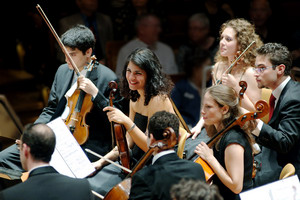Difference between revisions of "West-Eastern Divan Orchestra"
Przyvylska (talk | contribs) |
(→Equal in Music) |
||
| (2 intermediate revisions by 2 users not shown) | |||
| Line 3: | Line 3: | ||
[[File:Orchestra1.jpg|400x200px|framed|left]] | [[File:Orchestra1.jpg|400x200px|framed|left]] | ||
| − | Daniel Barenboim and [[Said, Edward|Edward Said]] founded the orchestra in 1999 as a workshop for Isreali, Palestian and other Arab musicians. The orchestra is based in Seville, Spain and has performed around the world. The aim of the orchestra is to promote understanding between Isrealis and Palestinians and to lay the foundations for a peaceful and fair solution of the Israeli-Palestinian conflict. In 2005 the orchestra performed in Ramallah, their first event in the Occupied Territories. For many Palestinians in the audience, this was the very first time they encountered Isrealis in a non-military setting. A young girl who saw Barenboim said: "You are the first thing I've seen from Israel that is not a soldier or a tank." The West-Eastern Divan Orchestra aspires to total freedom and equality and on this basis they come together and play music. Using music as a tool to promote understanding between Isrealis and Palestinians, is definitely an act of cultural diplomacy. | + | [[Barenboim, Daniel|Daniel Barenboim]] and [[Said, Edward|Edward Said]] founded the orchestra in 1999 as a workshop for Isreali, Palestian and other Arab musicians. The orchestra is based in Seville, Spain and has performed around the world. The aim of the orchestra is to promote understanding between Isrealis and Palestinians and to lay the foundations for a peaceful and fair solution of the Israeli-Palestinian conflict. In 2005 the orchestra performed in Ramallah, their first event in the Occupied Territories. For many Palestinians in the audience, this was the very first time they encountered Isrealis in a non-military setting. A young girl who saw Barenboim said: "You are the first thing I've seen from Israel that is not a soldier or a tank." The West-Eastern Divan Orchestra aspires to total freedom and equality and on this basis they come together and play music. Using music as a tool to promote understanding between Isrealis and Palestinians, is definitely an act of [[Cultural Diplomacy|cultural diplomacy]]. |
| + | |||
| + | == External links and references == | ||
| + | |||
| + | * [http://www.west-eastern-divan.org/ Official Website] | ||
| + | * [http://www.telegraph.co.uk/culture/music/proms/6055045/West-Eastern-Divan-Orchestra-interview-with-Daniel-Barenboim-for-the-BBC-Proms.html "West-Eastern Divan Orchestra: interview with Daniel Barenboim for the BBC Proms", by TheTelegraph] | ||
| + | * [http://www.danielbarenboim.com/news/news/article/daniel-barenboim-and-the-west-eastern-divan-orchestra-at-the-doha-festival-for-music-and-dialogue.html Daniel Barenboim and the West-Eastern Divan Orchestra at the Doha Festival for Music and Dialogue] | ||
[[Category:Acts of Music as Cultural Diplomacy]] | [[Category:Acts of Music as Cultural Diplomacy]] | ||
Latest revision as of 10:58, 7 April 2014
Equal in Music[edit]
Daniel Barenboim and Edward Said founded the orchestra in 1999 as a workshop for Isreali, Palestian and other Arab musicians. The orchestra is based in Seville, Spain and has performed around the world. The aim of the orchestra is to promote understanding between Isrealis and Palestinians and to lay the foundations for a peaceful and fair solution of the Israeli-Palestinian conflict. In 2005 the orchestra performed in Ramallah, their first event in the Occupied Territories. For many Palestinians in the audience, this was the very first time they encountered Isrealis in a non-military setting. A young girl who saw Barenboim said: "You are the first thing I've seen from Israel that is not a soldier or a tank." The West-Eastern Divan Orchestra aspires to total freedom and equality and on this basis they come together and play music. Using music as a tool to promote understanding between Isrealis and Palestinians, is definitely an act of cultural diplomacy.
